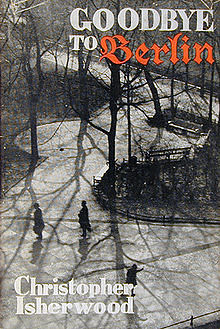I have read Goodbye to Berlin several times and each time that I read it, I'm always struck by the profound sense of sadness that permeates Isherwood's narrative. Amid his tales of the Nowaks, Landauers, Sally Bowles and the eccentric tenants of his landlady's house and his observations of gay night clubs and Communist meetings is the overwhelming sense of Weimar Berliners being lost in the present and being unable to bare the thought of what the future holds. Throughout the book, Isherwood the narrator hints that the future of Berlin will be dark and will suddenly change overnight (which it did in 1933 and this was published in 1939). But throughout his interactions with the characters, one can see that Berliners chose to ignore the inevitable future of the terms of the Treaty of Versailles holding out for only so long under an unstable government and instead turned towards living in an excessive, voluptuous panic of a sin city in the present. Even the characters who saw the danger posed by that failed hack artist in Munich chose to ignore what would come because Berliners were more concerned with doing whatever was necessary in order to eat and pay this week's rent. Isherwood is a keen observer and recorder of the general feeling and atmosphere of post-war Berlin, but he is an even better recorder of the wide spectrum of the city's populous during a time which will never and could never be repeated.
Out of all the characters that Isherwood encounters, the most famous and the most interesting is Sally Bowles. She is the embodiment of the Lost Generation. The female version of Jay Gatsby, if you will. And yes, Liza's performance in Cabaret is accurate in terms of capturing her personality for all of her faults. What makes Sally so fascinating is that she's living for today, in her velvet shoes and green nails, but she is always so sad since she had no concern for the future. I suppose that's what makes Sally so interesting to read and to meet a Sally in real life; she is fun to be around and you never know what she might think of next, but you can't stay around her forever since she keeps repeating her mistakes.
From the heights of the wealthy merchants to the debts of the working class families, and the artists and performers in between, Isherwood travelled seamlessly through them all as the young Englishman abroad and faithfully (more or less) tells of the characters that he met during his years working and living in Berlin. What he left us was a highly readable primary source of what it was like to live in Berlin in the days before it changed and with it, the world was changed.
At times, the narrative is funny, shocking and we wish to know more about what happened to the characters. But through it all is there is the sense of sadness that seeps through the characters words as we read it knowing that this lively city cannot last and we know what will happen all too soon. But it still remains one of the most important books that anyone who wishes to fully understand the twentieth century must read.
Goodbye to Berlin was adapted twice, first as a Code movie I Am A Camera (which I haven't seen but heard that it was terrible) and second as Cabaret, which is a great adaptation and faithfully recreated the flavour of Berlin as best as they good and Liza actually did wear vintage clothing in the film, which she picked out herself.
There was also a fascinating three part documentary series that the CBC did a couple of years ago on inter-war Paris, Shanghai and Berlin called Legendary Sin Cities, which you can "download" or you can buy it from Mr. Amazon


No comments:
Post a Comment